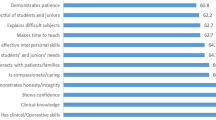Abstract
Purpose
Women in surgery still face many challenges, including inadequate representation, gender bias, and career disparities. The purpose of this study was to determine whether there is a gender imbalance in job satisfaction among general surgery residents and to identify the major contributing factors.
Methods
We used the Hoffman Vocational Values Scale (HVVS) to evaluate overall job satisfaction and 12 factors contributing to job satisfaction between male and female trainees within an urban university-based academic institution.
Results
For general surgery residents, job satisfaction was low regarding feeling respected, appreciated, involved, and unhindered. Female residents scored significantly lower on overall job satisfaction, specifically when it came to finding the work personally fulfilling, feeling respected and appreciated, having a role model, having moments of joy at work, and feeling as if they make a difference in the world. Both groups reported finding their vocation in surgery, and that work was essential to personal fulfillment.
Conclusion
These findings may provide institutional and training programs with a basis for considering how to increase trainee job satisfaction, particularly among female residents who report specific challenges related to the training environment.



Similar content being viewed by others
References
von Websky MW, Oberkofler CE, Rufibach K, et al. Trainee satisfaction in surgery residency programs: modern management tools ensure trainee motivation and success. Surgery. 2012;152(5):794–801. https://doi.org/10.1016/j.surg.2011.07.037.
Hollis RH, Theiss LM, Gullick AA, et al. Emotional intelligence in surgery is associated with resident job satisfaction. J Surg Res. 2017;209:178–83. https://doi.org/10.1016/J.JSS.2016.10.015.
Shanafelt TD, Balch CM, Bechamps GJ, et al. burnout and career satisfaction among American surgeons. Ann Surg. 2009;250(3):463–70. https://doi.org/10.1097/SLA.0B013E3181AC4DFD.
Appelbaum NP, Lee N, Amendola M, Dodson K, Kaplan B. Surgical resident burnout and job satisfaction: the role of workplace climate and perceived support. J Surg Res. 2019;234:20–5. https://doi.org/10.1016/J.JSS.2018.08.035.
Donaldson SI, van Zyl LE, Donaldson SI. PERMA+4: a framework for work-related well-being, performance and positive organizational psychology 2.0. Front Psychol. 2022;12:817244. https://doi.org/10.3389/fpsyg.2021.817244. (Published 2022 Jan 24).
Klifto KM, Payne RM, Siotos C, Lifchez SD, Broderick KP, Aliu O, Manahan M, Rosson GD, Cooney CM. Women continue to be underrepresented in surgery: a study of AMA and ACGME data from 2000 to 2016. J Surg Educ. 2020;77(2):362–8.
Association of American Medical Colleges. 2020 Physician Specialty Data Report. Association of American Medical Colleges. 2021. https://www.aamc.org/data-reports/workforce/report/physician-specialty-data-report. Accessed 27 Mar 2022.
Association of American Medical Colleges. Active Physicians by Sex and Specialty, 2019. In: 2020 Physician Specialty Data Report. Association of American Medical Colleges. 2021. https://www.aamc.org/data-reports/workforce/interactive-data/active-physicians-sex-and-specialty-2019. Accessed 16 Mar 2022.
Association of American Medical Colleges. Table B3. Number of Active Residents, by Type of Medical School, GME Specialty, and Sex. In: 2020 Physician Specialty Data Report. Association of American Medical Colleges. 2021. https://www.aamc.org/data-reports/students-residents/interactive-data/report-residents/2020/table-b3-number-active-residents-type-medical-school-gme-specialty-and-sex. Accessed 27 Mar 2022.
Davenport DL, Henderson WG, Hogan S, Mentzer RM, Zwischenberger JB. Surgery resident working conditions and job satisfaction. Surgery. 2008. https://doi.org/10.1016/J.SURG.2008.03.038.
Hoffman E, Soglian F, Ortiz F. Enhancing employee engagement: A validation study in Italy. Int Hum Resour Inf Manage J. 2009;13(3):44–1.
Hoffman E. Hoffman vocational values scale. Mind Garden. 2005. https://www.mindgarden.com/110-hoffman-vocational-values-scale#horizontalTab4. Accessed 27 March 2022.
Lussiez A, Bevins J, Plaska A, Rosin V, Reddy RM. General surgery resident satisfaction on cardiothoracic rotations. J Surg Educ. 2016;73(1):95–100. https://doi.org/10.1016/J.JSURG.2015.09.002.
Lee KP, Kelz RR, Dubé B, Morris JB. Attitude and perceptions of the other underrepresented minority in surgery. J Surg Educ. 2014;71(6):e47–52. https://doi.org/10.1016/J.JSURG.2014.05.008.
Bingmer K, Wojnarski CM, Brady JT, Stein SL, Ho VP, Steinhagen E. A model for a formal mentorship program in surgical residency. J Surg Res. 2019;243:64–70. https://doi.org/10.1016/j.jss.2019.04.068.
Rogers KM, Ashforth BE. Respect in organizations: feeling valued as “We” and “Me.” J Manag. 2017;43(5):1578–608. https://doi.org/10.1177/0149206314557159.
Silver JK, Bhatnagar S, Blauwet CA, et al. Female physicians are underrepresented in recognition awards from the American Academy of Physical Medicine and Rehabilitation. PM R. 2017;9(10):976–84. https://doi.org/10.1016/j.pmrj.2017.02.016.
Rasmussen JM, Najarian MM, Ties JS, Borgert AJ, Kallies KJ, Jarman BT. Career satisfaction, gender bias, and work-life balance: a contemporary assessment of general surgeons. J Surg Educ. 2021;78(1):119–25. https://doi.org/10.1016/J.JSURG.2020.06.012.
Freedman-Weiss MR, Chiu AS, Heller DR, et al. Understanding the barriers to reporting sexual harassment in surgical training. Ann Surg. 2020;271(4):608–13. https://doi.org/10.1097/SLA.0000000000003295.
Harris CA, Dimick JB, Dossett LA. Cultural complications: why, how, and lessons learned. Am J Surg. 2021;221(3):609–11. https://doi.org/10.1016/j.amjsurg.2020.09.002.
Author information
Authors and Affiliations
Corresponding author
Ethics declarations
Conflict of interest
The authors declare that they have no conflict of interest.
Rights and permissions
Springer Nature or its licensor (e.g. a society or other partner) holds exclusive rights to this article under a publishing agreement with the author(s) or other rightsholder(s); author self-archiving of the accepted manuscript version of this article is solely governed by the terms of such publishing agreement and applicable law.
About this article
Cite this article
St John, A., Kus, N., Abdou, H. et al. The experience of equity: evaluating the differences in job satisfaction between female and male general surgery residents. Global Surg Educ 2, 16 (2023). https://doi.org/10.1007/s44186-022-00092-3
Received:
Revised:
Accepted:
Published:
DOI: https://doi.org/10.1007/s44186-022-00092-3




